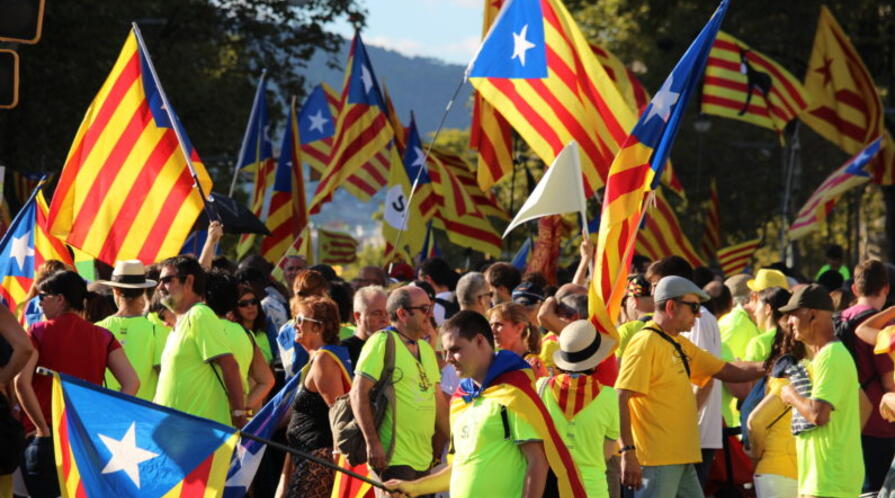Stanford scholar assesses Catalonia referendum

Sunday’s referendum vote in Catalonia, a northeast region of Spain seeking independence, was marred with violence as police forces from the Spanish government, which deemed the referendum illegal, clashed with Catalonians attempting to vote.
From 2011 to 2016, Francois Diaz-Maurin, a visiting scholar at Stanford University’s Center for International Security and Cooperation, lived and studied in Barcelona, Catalonia’s largest city. He offers his perspective on the events that unfolded over the weekend, why the Spanish government reacted so severely and what effects Catalonia’s quest for independence may have on Europe.
What are Catalonia’s motivations for independence?
The Catalonian pro-independence movement has historic, cultural and economic roots. Historically, pro-independence Catalans want to recover their sovereignty that was lost during the War of the Spanish Succession, a major European conflict of the early 18th century.
Culturally, there is a popular slogan: “Catalonia is not Spain.” Catalonia really has a very different culture from Spain. It has its own language, celebrations, traditions and historic references – which were all prohibited under Francisco Franco’s dictatorship (1939-1975). After the Catalan self-determination referendum was shockingly repressed by the Spanish police, it seems that Catalonia and Spain do not even share the same definition of democracy.
The independence of Catalonia also has some pragmatic motivations. Catalonia, one of the wealthiest regions in Spain, wants to be able to take full control of its economy. Indeed, after almost a decade of political gridlock – Spain’s Prime Minister Mariano Rajoy still does not have a majority at the Parliament after two elections. With a wave of austerity measures and multiple cases of corruption affecting Spain’s ruling party, the right-wing Partido Popular, Catalonia is looking for a way out of the economic and political crises.
Why was the reaction from the Spanish government so severe?
Although the Catalan independence referendum was considered anticonstitutional under Spanish law, what happened was an absolute shock. It gives a very sad image of a so-called advanced democracy. We should have been counting the ballots, not the numbers of people having received urgent care at hospitals – about 1,000 people, according to the Catalan government.
Yet, what is behind the Spanish brutality is much more trivial than it appears. In a situation of stalled political process, Rajoy, who has long lost legitimacy in Catalonia where the Partido Popular is not well-represented, could risk his seat if Catalonia becomes an independent state. So, in my view, the harsh reaction of the Spanish government is at the crossroad between a long tradition of brutality and the fear of one to lose power.
Rajoy said that the rule of law was still reigning in Spain, which remained unified, and called for opening negotiations. But negotiating was never an option for the Spanish government, which refused to discuss the possibility of a referendum. That is no longer an option for the Catalan government after this violation of its sovereignty and fundamental rights of its people.
Despite all the troubles, yesterday’s Catalan referendum resulted in more than 2.2 million citizens – out of 5.3 million voters – voting at 90 percent in favor of the independence, although 770,000 ballots could not be counted due to the Spanish police operations, which seized and destroyed ballot boxes, according to news reports. Catalonia government’s President Carles Puigdemont said in a communiqué that an independent state in the form of a republic will be proclaimed after approval of the referendum’s results by the Catalonian Parliament.
What impacts could these events have on Europe in terms of other regions following Catalonia’s actions?
The situation of Catalonia has always been intertwined with the history of Europe, and there is no surprise that the current situation in Catalonia is getting much attention from outside of Spain. So, one can expect that the referendum in Catalonia will certainly reinforce the pro-independence movements in other regions of Europe, such as Scotland, Basque Country, Flanders, Belgium, and Veneto, Italy. Yet, the repression of the Spanish government also poses some dilemma.
The Catalan referendum has some deeper implications as far as the definition of democracy. The Catalans’ fundamental rights were violated by the same institutions that should be protecting their fellow citizens. Of course, this happens in numerous countries every day with some complacency. But those countries do not pretend to be the flagships of democracy. That makes a big difference.
What happened in Catalonia clearly does not show the best image of Europe as a unified community. Only very few state officials and foreign observers from Europe condemned the repression of the Spanish government, despite the fact that it clearly violated the European charter of fundamental rights. What we are seeing is clearly the end of the European model as we know it. In days like the one we just have witnessed we clearly see that democracy is much more fragile than it seems. What we take for granted such as the right to deliberate over a political project can encounter the brutality of dictatorial regimes.
Milenko Martinovich is the deputy director for social science communications in the Stanford News Service. He wrote this story for the Stanford News Service.
Francois Diaz-Maurin also wrote this story on Catalonia for the Freeman Spogli Institute's Medium site.
